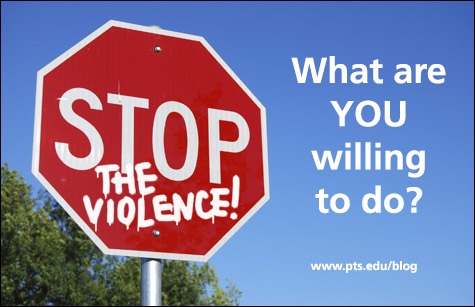The spectrum of youth violence categories ranges vastly from elementary school bullying to teen homicides. In a 2011 nationally-representative sample of youth in grades 9-12, 20.1 percent reported being bullied on school property in the preceding 12 months, and 16.2 percent reported being bullied electronically (e-mail, chat room, website, texting). [1] The effects of bullying include physical, social, academic, and emotional harm with bullying as a huge contributor to youth suicide. Furthermore, in 2010, 4,828 young people ages 10-24 in the US were victims of homicide—an average of 13 each day, 82.8 percent of whom were killed with a firearm. [2] Such youth violence has seen an upward trend in the city of Pittsburgh.
While many Christians complain about the youth violence issues in our city without actively becoming part of the solution, some local churches try to provide pastoral care through Christian youth ministries. However, more often than not it is limited to kids with ties to the church who already participate in the life of the church, which is not a significant sampling of youth at risk for violent offenses.
There are noteworthy Christian organizations throughout the greater Pittsburgh region addressing these issues head on through mentorship and afterschool programs like Homewood Children’s Village, the Pittsburgh Project, Bible Center Church, and Amachi Pittsburgh. Amachi Pittsburgh provides a youth mentorship and family support program for kids with incarcerated parents that boasts a 92 percent success rate of program participants avoiding the criminal justice system as juveniles and adults. Amachi partners with local churches in Allegheny County to acquire committed mentors, however there remains a significant mentor vacancy with many willing kids still waiting to be matched.
Another organization of note is “The Point” which serves the Parkesburg, PA, region near Philadelphia. It was founded in 2003 and is funded by local businesses, churches, and community leaders. Their mission is to provide after-school, weekend, and summer programs for at-risk and vulnerable youth in the area and provide a safe haven by addressing the spiritual, physical, emotional, and academic needs of the community through the hopeful message of the Gospel.
A few national Christian organizations with local presence provide more intensive programming such as Teen Challenge. They provide long-term “spiritual boot camps” for troubled youth within a system of extreme accountability while teaching personal responsibility.
What if local churches took personal responsibility to address the issues facing youth in their respective neighborhoods regardless of whether the families are involved in the life of the church? What if local churches partnered with other churches in more at-risk areas to be of assistance in addressing youth violence? What if more churches made commitments to successful prevention programs like Amachi Pittsburgh so that mentors would be waiting for kid matches as opposed to the current opposite? As Christians there are a lot of opportunities to get involved in preventing youth violence, the question always is, what are YOU willing to do?
[1]Centers for Disease Control and Prevention. Youth risk behavior surveillance—United States, 2011. MMWR, Surveillance Summaries 2012; 61. www.cdc.gov/mmwr/pdf/ss/ss6104.pdf.
[2] Centers for Disease Control and Prevention, National Center for Injury Prevention and Control. Web-based Injury Statistics Query and Reporting System (WISQARS) [online]. (2010). www.cdc.gov/injury.
Kimberly Merrell, an MDiv program alumna of Pittsburgh Theological Seminary, is the director of the Metro-Urban Institute at PTS.


Kerri – The most prized cdmioomty that adults have is TIME. Our children are starving for an adult who takes the TIME to sit and BE with them, LISTEN to them, LAUGH with them and if necessary CRY with them. They are seeking our full attention, unplugged from the news or our iphones. Preaching to them or at them is not what they are in need of. If we are not living the life of faith they will not listen to our agenda filled speeches. This generation can spot and CALL out a hypocrite in a split second. This generation appreciates when we can share our own failures and experiences with a genuine heart. Time is all they are asking for and this generation of youth is over scheduled and neglected in a very different manner than generations of the past. It appears as though all of the advantages we offer by way of tutors, private lessons, excellent college level courses in high school; all which are based upon their performance is not giving them a better chance or a leg up . It is creating a loneliness within and often creates young adults that either feel they don’t measure of or they give up. Once example, most kids don’t even work at getting their own drivers license .how bizzare. We have a generation of lonely young adults that are burnt out by 25. This is just what I am experiencing while raising two pre teens and one teen
I not sure where you are getting your information, but great topic. I needs to spend some time learning more or understanding more. Thanks for magnificent information I was looking for this information for my mission.